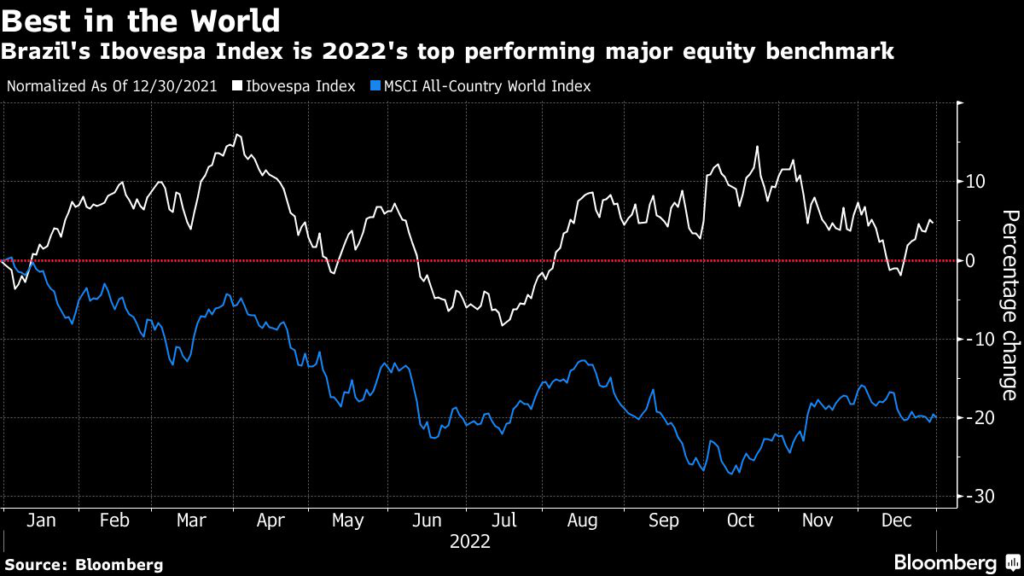Brazil won the crown of this year’s best-performing major equity market after beating contenders with a late rally, in what has been a brutal 12 months for global stocks.
(Bloomberg) — Brazil won the crown of this year’s best-performing major equity market after beating contenders with a late rally, in what has been a brutal 12 months for global stocks.
The Ibovespa Index climbed 4.7% in local-currency terms, making it one of the few exchanges with more than $500 billion of market cap to finish in the green, outpacing gains by bourses in India and the UK, according to data compiled by Bloomberg. The MSCI All-Country World Index tumbled about 20% over the same period as investors faced surging inflation and rapidly rising interest rates worldwide.
While Brazil’s inflation hit a peak of more than 12% in April, its central bank started an aggressive hiking cycle back in early 2021 that helped slash inflation by half by year end, possibly opening space for rate cuts next year. That, coupled with valuations that are among the cheapest in the world, has helped spur demand for the nation’s stocks even as political uncertainty continues to loom large.
Brazilian stocks remain cheap on a historical basis with a 12-month blended forwards price to earnings ratio of 6.7, compared to a 10-year average of 10.8 times. And swaps are pricing in rate cuts starting in the second quarter of next year.
Traders have been on edge for the better part of two months following Luiz Inacio Lula da Silva’s presidential victory amid concern increased fiscal spending will reignite inflation, prompting the central bank to keep interest rates higher for longer than previously expected.
“Most investors may wait for reassurance that Lula’s fiscal policy is sufficiently responsible before taking the plunge, but cheap valuations suggest they are also being compensated for that risk,” said Hasnain Malik, a strategist at Tellimer in Dubai.
Foreign investors were a major driver of this year’s rally, purchasing a net $19 billion worth of Brazilian stocks, the most ever in data compiled by Bloomberg dating back to 2009. That snaps a four-year stretch of selling and includes roughly $3 billion of net buying in the two months since Lula was elected.
Unsurprisingly, Brazil’s outperformance comes alongside a bounce-back year for Vale SA, the largest stock in the Ibovespa with a nearly 20% weighting. Shares of the iron ore mining giant rallied 14%, rebounding from their worst year since 2015 thanks in large part to rising base metals prices since Russia invaded Ukraine and more recently, on optimism that an end to Covid Zero policies in China will spur demand.
Vale’s outsized weighting in the Brazilian benchmark helped paper over the losses seen by many of its other members. Of the gauge’s 91 stocks, about two-thirds ended the year in the red, including state-controlled oil producer Petroleo Brasileiro SA, which floundered in recent weeks amid concern over political interference.
Despite that skewed performance and political worries, the gains seen by the Ibovespa are expected by many to continue into next year. Earlier this month, JPMorgan Chase & Co. strategists led by Emy Shayo said they expect the gauge to finish 2023 near an all-time high of 130,000, in part to China’s economic reopening. That compares with Thursday’s close of 109,734. Meanwhile, Bank of America expects the index to close next year at 135,000.
“There is still a lot of risk priced in,” said Bradford Jones, a portfolio manager at Sagil Asset Management Ltd. in London. “If the political noise dissipates, Brazilian stocks can have another strong year.”
But not everyone is convinced. Morgan Stanley, which had been recommending clients to go overweight Brazil since October of 2018, downgraded the country’s equity market in late November, citing uncertainty surrounding the president-elect’s policies.
–With assistance from Farah Elbahrawy, Geoffrey Morgan and Michael O’Boyle.
More stories like this are available on bloomberg.com
©2022 Bloomberg L.P.










